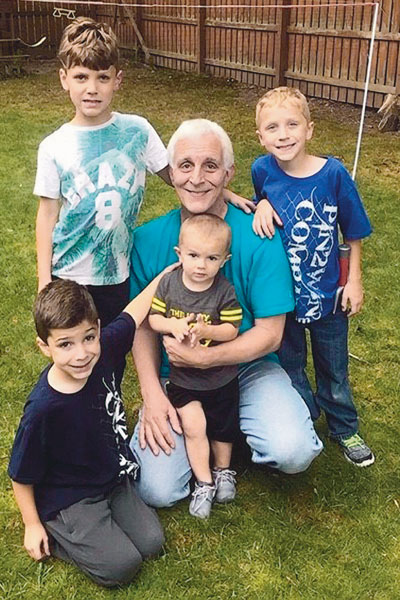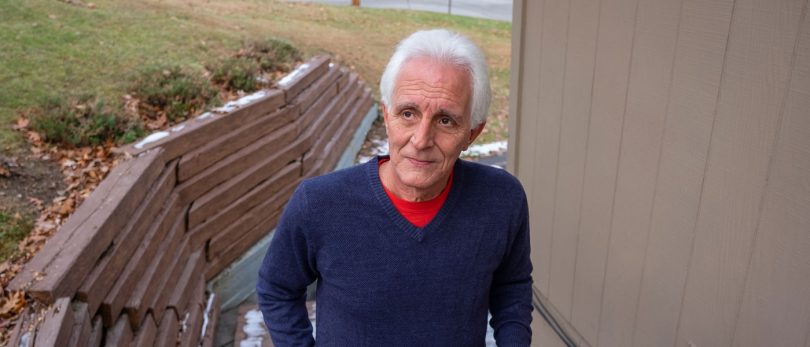When Bob Gritsavage had his regular checkup last year, he braced himself for the results of his prostate-specific antigen (PSA) test, which detects the possibility of prostate cancer. His grandfather had died of the disease, and Mr. Gritsavage had come to feel like it was only a matter of time before he developed the cancer as well.
As it turns out, that time had come.
After a biopsy confirmed he had prostate cancer, and a bone scan thankfully showed it had not spread to other parts of his body, Mr. Gritsavage was presented with his options. He briefly considered a procedure involving radioactive seeds, but that meant his grandkids couldn’t come close to him for a certain period of time, and missing those hugs would be too tough to bear, he says.

For Bob Gritsavage, being free of prostate cancer means more time doing the things he loves, including being a grandfather.
He also felt reluctant when it came to radiation, and that left surgery—which was a terrifying prospect, because he had actually never been in a hospital except for when he was born 64 years ago.
“I was really scared, because I had no idea what to expect; it made me a complete chicken,” he recalls. “Although I kept trying to find nonsurgical options, this was really the only one that felt like a good fit. So I tried to be brave and get it done. Fortunately, the use of robotic surgery turned the whole experience into a breeze.”
The procedure was done with the da Vinci surgical system, which allows a surgeon to sit at a console and view a magnified 3D high-definition image of the surgical area, manipulating surgical tools through interactive robotic arms.
“This system offers a higher level of precision in operations like the one Bob had,” says Nick Liu, MD, urologist at Upstate Urology of UHS, who performed Mr. Gritsavage’s procedure. “Not only does that improve the surgery itself, but it has profound effects when it comes to recovery and outcomes.”
The Art of da Vinci
Mr. Gritsavage had his procedure done by Dr. Liu in Syracuse, since it was just before UHS secured its own da Vinci surgical system. But now, this cutting-edge technology—and in a newer version than the one used for Mr. Gritsavage’s surgery—is available at UHS, giving more patients the opportunity to experience the benefits, Dr. Liu says.
“This is the newest robotic surgery system available, and we truly believe this will transform the way we practice medicine in this region,” Dr. Liu says. “This is the first step toward a Robotic Surgery Program that is focused on bringing the best possible surgical options to our patients.”
Some of the advantages of the robotic surgical system include faster recovery, less pain, less need for painkillers and less blood loss during surgery. See “The da Vinci Details” below (with web-exclusive comments from Dr. Liu) to learn how these advantages make a big difference for patients.
In addition to the prostate cancer surgery that Mr. Gritsavage had, the system can be used for a wide range of other procedures as well, says Dr. Liu, giving patients an opportunity to recover faster, have less pain, and get back quicker to their normal lives.
Back on Track
For Mr. Gritsavage, all of these robotic surgery benefits have added up to a robust, easy recovery. Most of all, he feels a deep sense of relief and gratitude that he will be here for his family, and not following the same path as his grandfather.
“I don’t have to worry about it anymore, I don’t feel anxious about it coming back and I can put that behind me,” he says. Although he’ll get rechecked yearly, Mr. Gritsavage is anticipating plenty of time with his four grandsons, who are all under the age of 10 and certainly keep him busy.
“If anyone has fears about this surgery, they can come and talk to me,” he says. “It has made a huge difference, and Dr. Liu is fantastic. I feel like I have my life back.”
THE DA VINCI DETAILS
The da Vinci surgical system offers many advantages compared to traditional surgery. As part of UHS’ new Robotic Surgery Program, Nick Liu, MD, urologist at Upstate Urology of UHS, uses the da Vinci XI Robot to perform miminally invasive surgery on his patients. He explains that the advantages for patients include:
- Faster recovery. With such a minimally invasive procedure, patients can expect shorter hospital stays, and can often go home the next day. Dr. Liu says that’s a boon to recovery, because studies have shown people recover better at home. “The old way of doing things is having someone in the hospital for a few days or even a week, just for monitoring,” he notes. “But they’re exposed to germs, they don’t sleep as well, they have nurses checking their vitals, and it simply takes longer to get back to their every activities. Obviously, if it’s necessary, that’s different. But if it’s only about recovery, then being home is best.”
- Less pain. Because incisions are smaller, they tend to involve less pain than the larger incisions used in more traditional surgeries, and they also heal faster. For example, Mr. Gritsavage says he felt no pain at all both after the surgery and during recovery.
- Less need for narcotic or opioid pain medications. With less pain comes less need to manage it. That means patients can often minimize or even avoid use of pain medications. “With the concern about post-surgical pain medication addiction, we obviously want to vigilant about how we’re controlling pain,” says Dr. Liu. “Finding ways to avoid as much pain as possible is the best approach.”
- Less blood loss. The small incisions have another huge plus in the form of greatly reduced blood loss. Dr. Liu says a more traditional surgery could have up to 10 times the amount of blood loss, which often creates the need for a transfusion. When that happens, it means a longer hospital stay—because blood pressure lowers—as well as a more challenging recovery, because transfusions can suppress the immune system. “There is research that blood transfusion for any cancer surgery can worsen outcomes compared to when they are not used,” says Dr. Liu. “Because of that, anything we can do to lower blood loss is a big advantage.”







